Stripe Vs Square Vs PayPal – Price, Features Comparison
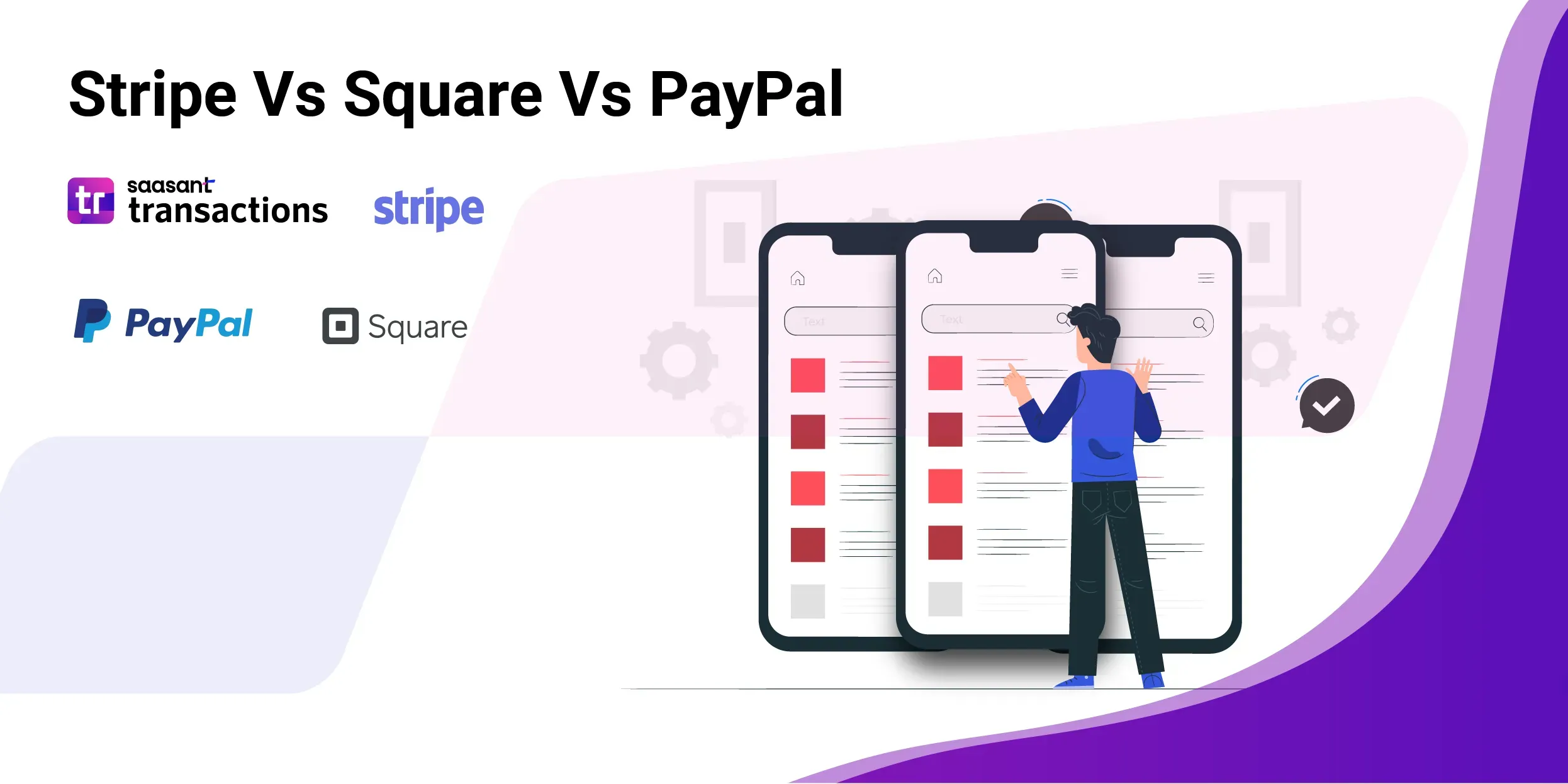
Using payment processing gateways in tandem with your Small business can escalate your business financial fluidity. In simple words, figuring out your business type and opting for the relative payment processor is a big plus for any small business. In this article, we will compare the top three payment processors, Stripe vs PayPal vs Square in depth.
Despite having a few similarities in the functioning, each payment gateway is well known for certain business models. For example, PayPal works great for global recognition, Square works best for in-person payment processing, meanwhile, Stripe provides extreme flexibility for developers. Let's compareStripe, Square, and PayPalfor their fees, pricing, customer service, payment, feature comparison, and more to figure out which payment processor works best for your small business.
Contents
Pre-Requisites
Prerequisites for Stripe
Prerequisites for Square
Prerequisites for PayPal
Pros & Cons (Square Vs Stripe Vs PayPal)
To Summarize
Pre-Requisites
Prerequisites for Stripe
Overview: Stripe is a payment processor that lets you transfer payments to your bank account via credit and debit card transactions. Stripe offers complete flexibility to developers with its aggregate transaction system. Nevertheless, there are certain requirements to initiate your payments with Stripe.
Stripe demands for certain verification steps before transacting any amount. Some of the prerequisites include:
Businesses are required to submit business identification details such as address and business ownership. You will also have to include your bank account information.
You need to check if Stripe supports your business category and product/services.
Determine the risk level of your business across-the-board.
Apart from this, you need to meet certain requirements designed by Stripe (financial partners, credit card networks, and regulators) to conduct your business to start using Stripe. Providing the relevant information prevents the misuse of the financial system. Also, your potential customers will be attracted to clean and relevant business information during the transaction.
If Stripe fails to process any information or if you fail to complete these checks, Stripe will contact you, demanding more information for keeping your transactions running smoothly.
Prerequisites for Square
Overview: Square is a financial services, merchant services aggregator, and mobile payment services system where you can opt for credit card transactions or online on the go transactions. It omits the bank fee, merchant account processor fee and charges a flat rate which seems flexible for small businesses. Square provides the most comprehensive and user-friendly free point-of-sale (POS) system in comparison to other payment processors. As a result, Square is used as part of their day-to-day operations by millions of small businesses.
To start your journey with Square, you need to ensure if all the requirements mentioned below are met.
Social Security number (SSN).
US-based bank account.
Date of birth: Current credit card regulations require our customers to be 18 years of age or older to create a Square account.
US home mailing address.
For developer account,
From your developer dashboard, create a new application. Please note that you cannot name your application as Square or include the word Square.
Check for your application ID and access token once your newly created application is located on your dashboard.
Prerequisites for PayPal
Overview: In a layman's language, you can transfer or request payment via PayPal from any corner of the world. If you are an e-commerce website or mobile commerce, PayPal can be your best friend to attract genuine global customers.
In PayPal, you either send payouts or receive payments. Head over to the PayPal developer's page to set up your PayPal business account.
To send payouts, you'll need to meet the below-mentioned requirements:
You need a PayPal business account.
Grant yourself access to PayPal Payouts.
Submit your identity information like email id, bank account information(linked to your PayPal business account)
Have minimum funds in your PayPal business account.
To receive PayPal payments, you need to confirm your email address with PayPal. Your first payment will be notified via email where you need to manually give access to receive payment. After your first payment, you will receive the payments automatically transferred into your bank account.
Pricing Plans of Stripe, Square, and PayPal
A small business needs to find a payment processor that supports its financial budgets. Let's shift our focus to the cost part and compare the three payment gateways in terms of pricing.
Stripe Fees
The transaction stripe processing fee is usually rounded up to 2.9%+$0.30
Stripe doesn't feature any hardware options.
Stripe follows a simple, straight-forward and easy to understand API payments. In the case of Integrated payments API, you'll be charged for successful transactions only. Additionally, Stripe doesn't charge any monthly fee or setup fee. For every successful payment you do in Stripe, you'll be charged 2.9% of the transaction, plus 0.30 dollars per transaction.
Meanwhile, in the case of Customized API (only if your transaction volume is high), you will be provided special access to customizable rates. To do this, you need to contact the Stripe team and request a quote. You'll be further notified with different customizable rates by the Stripe team.
PayPal Fees
PayPal POS pricing/transaction fee: 2.7% to 3.5% + $0.15
Hardware price range: $14.99 to $99.99
PayPal charges around 2.9% of the transaction amount with an additional processing fee of $0.30 per transaction, for every successful payment you make or process through a PayPal product. This PayPal pricing is considered the default for PayPal Checkout and PayPal payments.
Meanwhile, there are a few PayPal fee exceptions like PayPal Payments Pro. In this case, you will be charged $30 extra every month apart from the default PayPal processing fee of 2.9% + $0.30.
Additionally, if you process your payment through PayPal Here with a card reader, you will be charged 2.7% of the transaction amount. However, if you make a keyed-in payment via PayPal Here, you'll be charged 3.5% of the transaction amount with an additional $0.15 per transaction.
Apart from this, if you try your hands on PayPal Invoicing, it'll cost your business 2.9% plus $0.30 as the payment processing fee. The few are accountable only when your customer conforms the invoice with a card payment.
Square Fees
Square pricing/transaction fee: 2.5% + $0.10 to 3.5% + $0.15
POS Hardware pricing: Free, until processing amount of $799
Square has a wide array of payment products, therefore you may feel that Square pricing is a little complicated. Depending on what Square product you use, the Square processing fee is calculated.
In the case of Square POS systems, your transaction fee will range from 2.6% plus $0.10 of Square processing fee to 3.5% plus $0.15 of Square fee, solely depending on which POS hardware you process your payments through.
In case of card payment processing with a Square headphone jack or Bluetooth reader, your business will be charged 2.6% + $0.10 of the transaction value.
If you are processing the payments through the Square stand, it'll cost your business 2.6% + $0.10 of the transaction value.
If you process card payments through the Square Terminal, you will be charged 2.6% + $0.10 per transaction.
You have to pay the same fee in case of card payment processed through the Square Register.
Square offers free basic software where the Square point of sale system runs. Nevertheless, if you choose the Square for Retail app, it will cost your business $0, $60, or $299 every month depending on the plan you choose.
In-person transactions fee: 2.6% + $0.10
In-app transactions fee: 2.9% + $0.30
Online transactions fee: 2.9% + $0.30
Square invoicing will cost you 2.9% of the invoice value, plus $0.30 if your customer fulfills the payment via card. If you receive your payment via check or cash, you will be enjoying Square invoice for free.
Now that you have an idea of the price points of all three payment gateways, let us find out which one will suit your business the best by comparing their features.
Security
When we talk of any platform taking all our business finances under control, it's vital to look for the one that provides excellent security tools for both your business and customers. Luckily, all the three payment gateways Stripe, Square, and PayPal have robust features and offer secured payments. All of them are PCI Compliant and use end-to-end encryption to store data. Besides this generic security, these companies employ additional internal security, deploy fraud protection practices and enable the right security from unauthorized access. Stripe, Square, and PayPal are completely trustworthy for securing your financial data.
Chargebacks and Refunds
Chargebacks can be considered as one of the pain points of using a payment processor. However, if you are aware of the handling tactics, your business can save up a huge amount. PayPal charges $20 apart from the transaction fee. The transaction fee is non-refundable, however, the additional $20 is refundable in case you have a valid prospect in the case. On the other hand, the refundable amount in Stripe is $15. In addition to this, Stripe offers Credit card fraud protection in its Stripe Radar feature package. Meanwhile, Square doesn't charge any extra fees or chargebacks, therefore no issue with refunds.
Payment methods & availability
Known for its global outreach, PayPal supports 25 currencies and is available in 200+ countries. Therefore if you are an e-commerce looking for potential global customers, PayPal is for you. PayPal payments are inclusive of various payment methods including PayPal Cash, PayPal Cash Plus, bank accounts, and rewards balance.
Stripe is currently available only in 39 countries, however, it offers a tremendous growth trajectory with around 135 different currencies while accepting payments. Stripe payments accept all types of major cards including Mastercard, Visa, American Express, JCB, and more.
Square, on the other hand, is available only in the UK, Japan, Australia, and the USA. Also Square does not support multiple currencies as of now. Square payments accept internationally-issued chip or magstripe cards like Visa, MasterCard, American Express, and Discover.
Customer Support
Unfortunately, all three payment gateways (Stripe Customer service, PayPal support, and Square support) are not well known for excellent customer support. They do offer certain customer services like Phone & Email Support, Live chat support, Developer Support, Social media, and Community forums, etc. But the companies lag an effective customer support feature.
User-Friendliness
PayPal has an extremely easy to use interface. It is easy to set up, integrate, and process payments, even for the techno-dumbos. If you have a basic knowledge of HTML, you can easily set up PayPal by copy-pasting the developer tools.
As mentioned earlier, Stripe is exclusively designed for developers and often appeals to the developer's eye as a great selling point. If you lack developer skills, you may find the Stripe interface challenging to set up and integrate. Nevertheless, it offers comprehensive developer tools and libraries.
Square offers a simple to use interface just like PayPal. It is easy to set up, integrate and start processing your payments into your business software with its APIs. It also includes a plethora of resources to guide you through the setup process.
Detailed Comparison of Stripe, Square, and PayPal for Small Businesses
Here is a comparison table of Stripe, Square, and PayPal, based on some of the most important features and factors for small businesses.
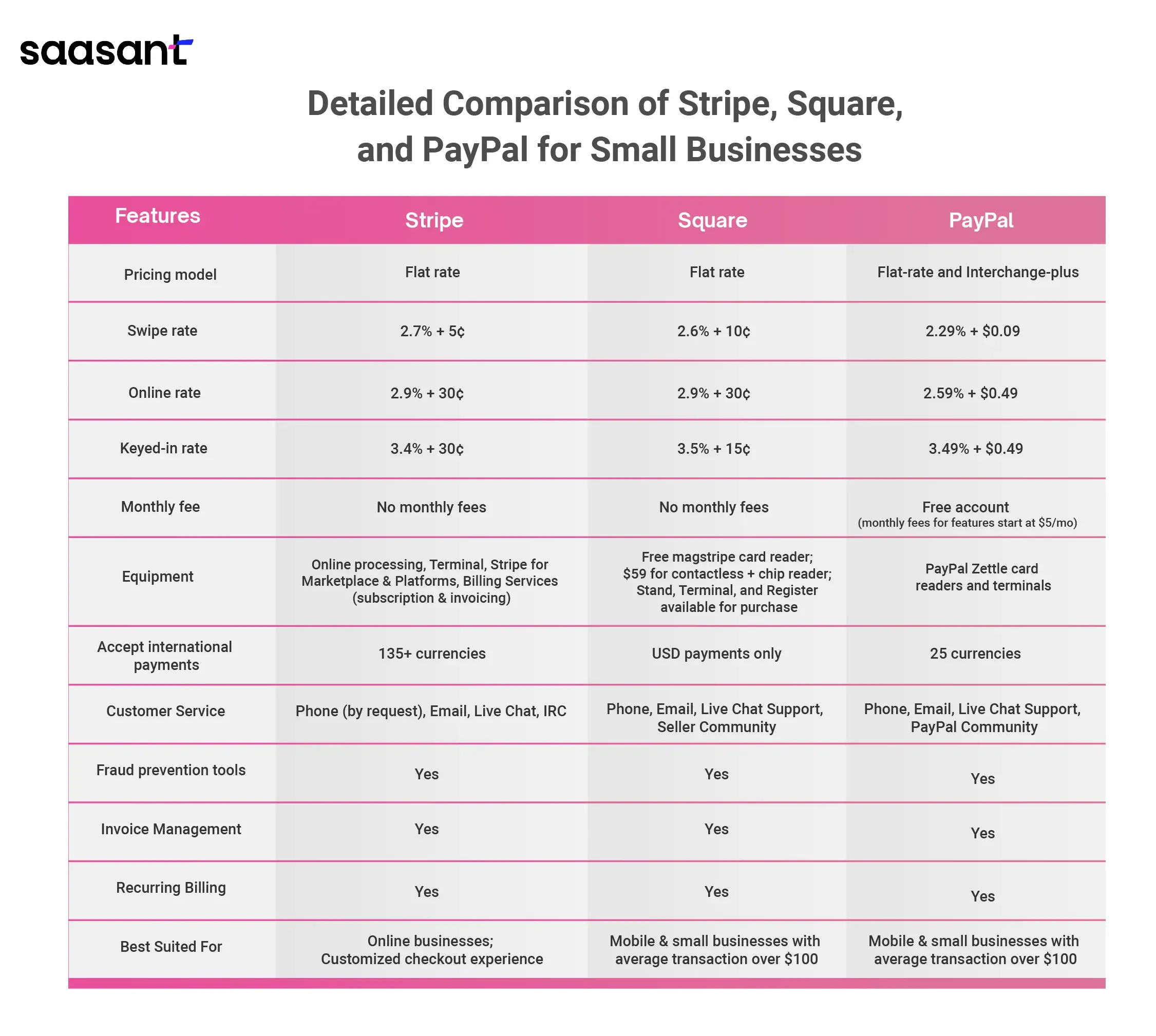
Pros & Cons (Square Vs Stripe Vs PayPal)
Let's not stick to the regular comparison of the payment gateways and head a step further by discovering the pros and cons of each payment gateway in detail. This will help you seal your decision as to which payment gateway will make a perfect match for your growing small business.
Like all service providers, Stripe, Square, and PayPal have their share of pros and cons. Each of these payment processors has unique and powerful features to offer.
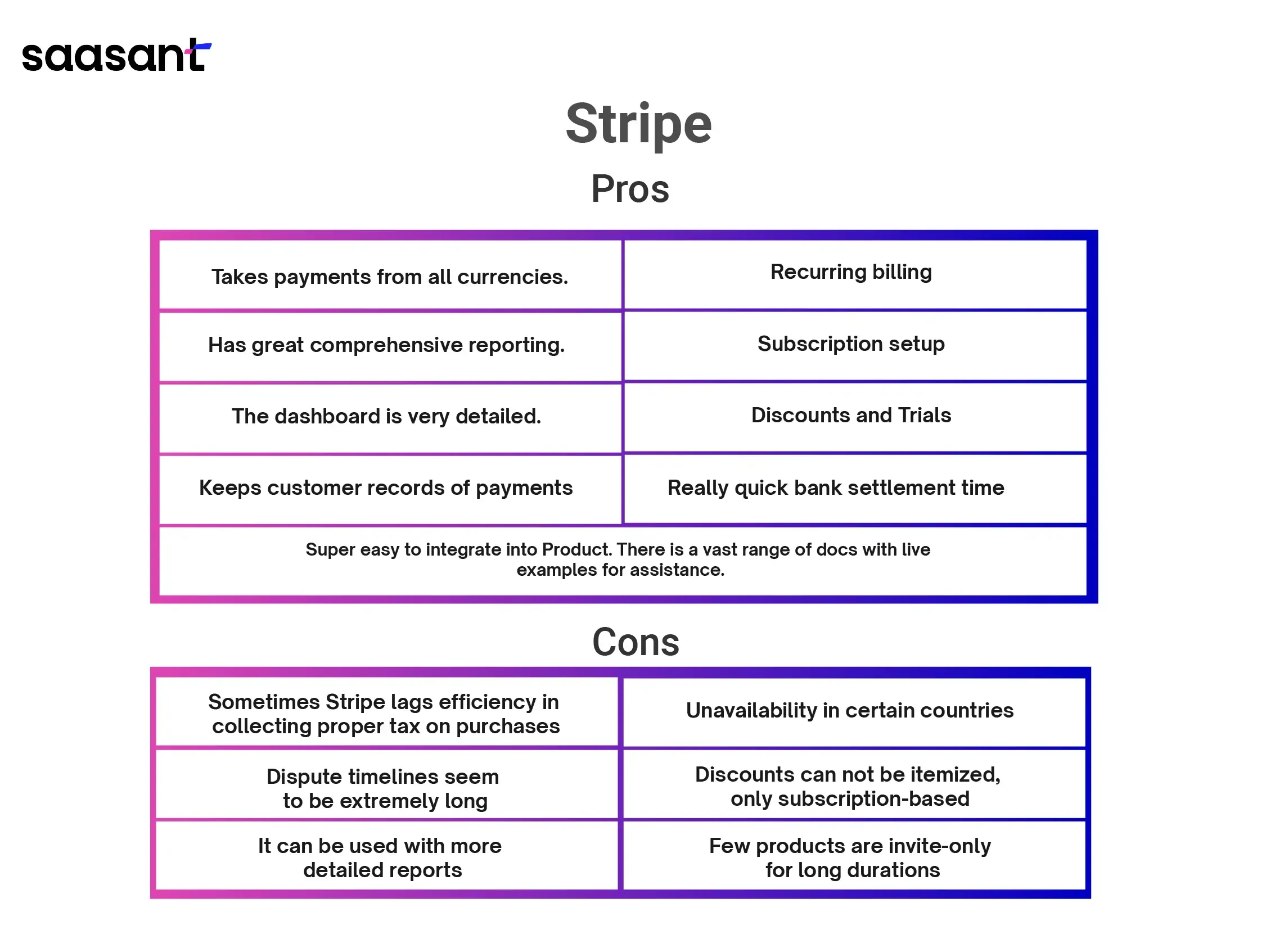
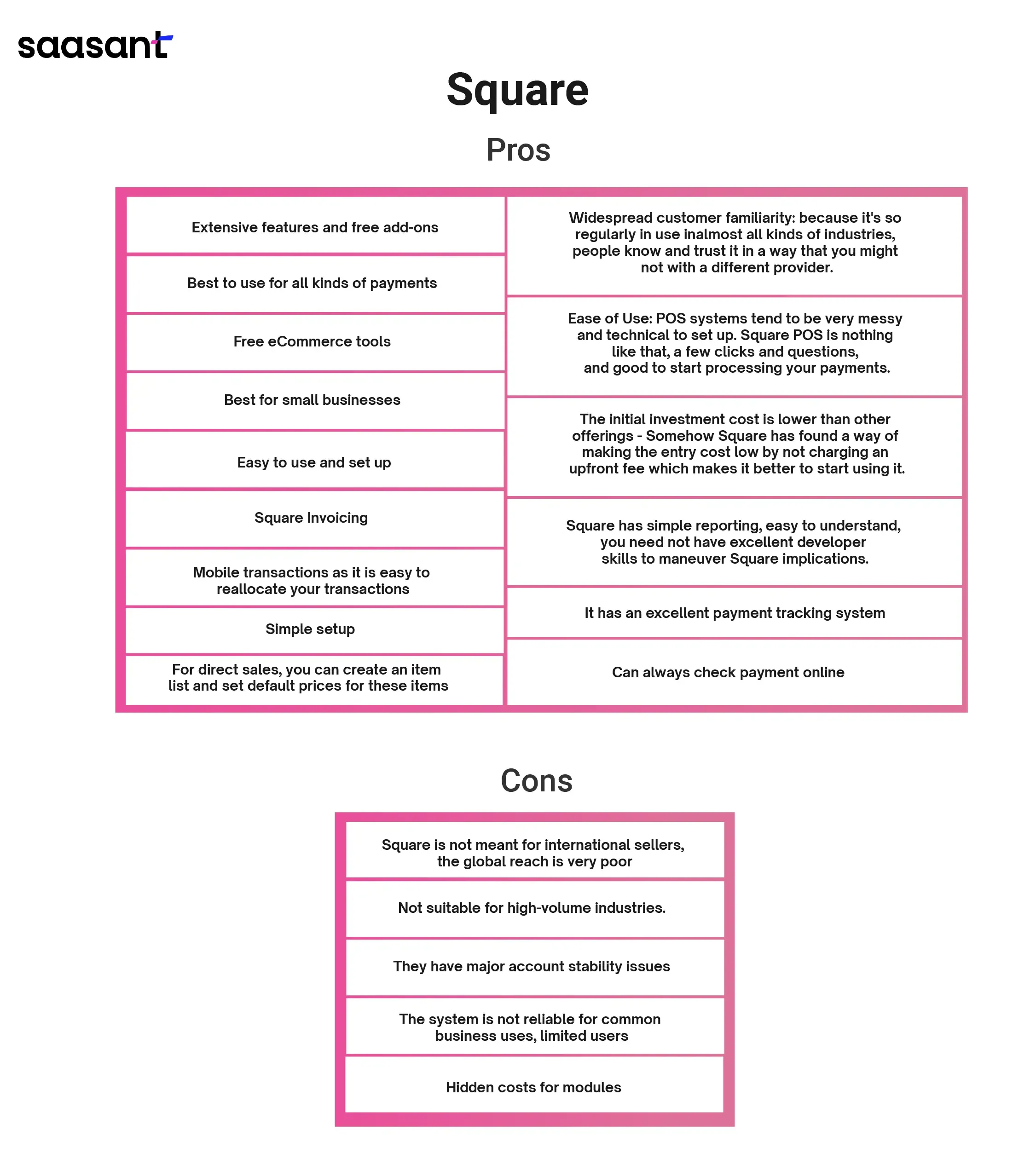
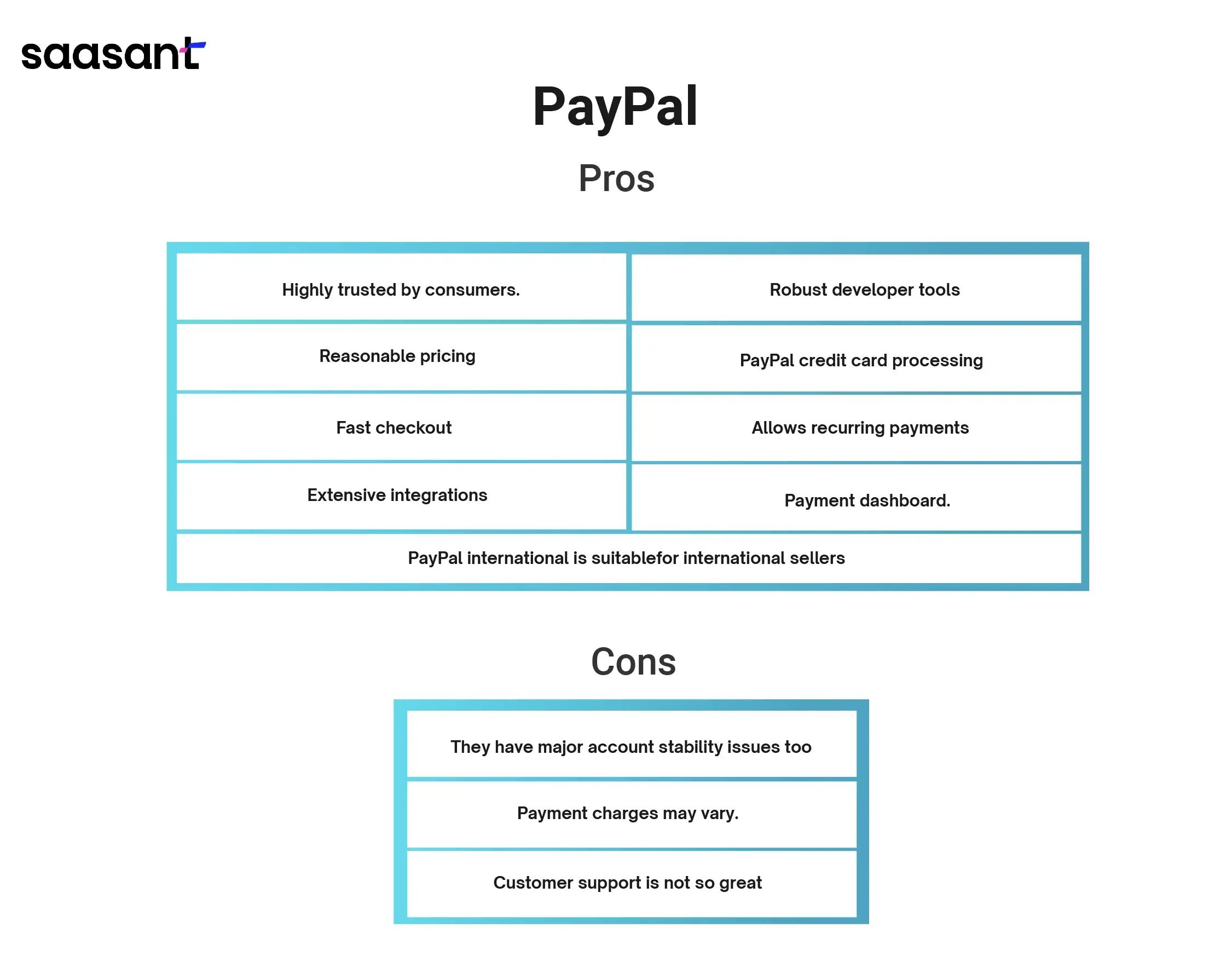
To Summarize
You must have figured out by now which payment gateway will support your business the best. If not, don't worry, we'll give you a brief review on when to choose Stripe, Square, and PayPal.
When to Use Stripe
If you are a developer looking for extreme flexibility and customization when building online payment channels, Stripe is your perfect match. The pricing is reasonable and impressive for the advanced developer tools they provide. In this case, developers can integrate with more APIs with Stripe than with any other payment processor. Stripe also offers powerful tools for subscription-based businesses.
When to Use Square
Square’s extensive collection of point-of-sale (POS) devices makes it an excellent choice for brick-and-mortar stores and service providers who rely on in-person payments. Square’s hardware solutions, including on-the-go readers, the Square Terminal, and the Square Register lets you accept payments from any corner of the world.
Also read:
When to Use PayPal
PayPal is the most popular online processing payment gateway in the market. PayPal gives your business credibility and brand recognition and this makes PayPal the best payment processing choice for businesses that want to take online payments. PayPal has the simplest user interface and integrates well with almost all the common website platforms. If you run an e-commerce store and are looking for potential customers on a global level, go for PayPal.
Ultimately, to figure out your perfect payment gateway that is ideal for your business type, you need to first list your business needs according to your business type.
If you were looking for a super automation application that would get all of your PayPal, Square or Stripe transactions into QuickBooks in one place, then you ought to try SaasAnt PayTraqer, a versatile automation application for QuickBooks. Start your Free Trial Now!
If you want to know more on how to verify PayPal, Read - How to Verify a PayPal Account?